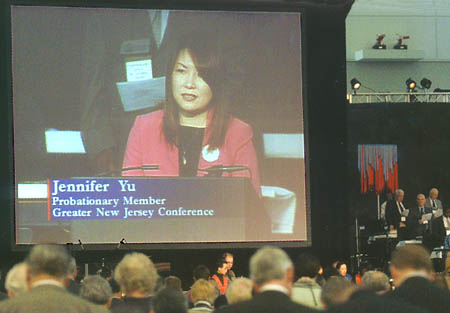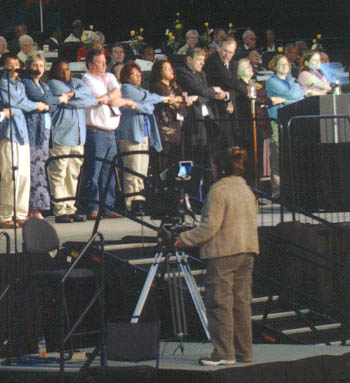Methodist Conferencing
Written June 5, 2004
Pittsburgh hosted the 2004 General Conference of the United Methodist Church, which was held over a two-week period this spring at our new David L. Lawrence Convention Center. I was there to provide video graphics, typing up and recalling the titles that appeared on the two large video screens at the front of the hall. Closed-circuit feeds also went to other locations at the Convention Center and were recorded for posterity.
In the small Ohio town where I grew up, I was a member and part-time organist at the First Methodist Church, and my parents were also involved in church activities and administration. So I know something about Methodism at its lowest levels. Now, in Pittsburgh, I would see something of the top level.
On Tuesday, April 27, the tongues of nearly a thousand delegates began the Conference's opening worship service by singing the first hymn in the Hymnal, "O for a thousand tongues to sing my great Redeemer's praise!"

Although the General Conference meets only once every four years, church rules give the delegates the sole responsibility for setting policy for the 8.3-million member denomination. So there was much legislation to be discussed.
At the local level, many Methodists are conservative (Laura Bush was a member and got her husband to join as well), but at the top level, the United Methodists are liberal. The President was invited to the General Conference. However, he had earlier declined to meet with United Methodist bishops, and he and Laura declined to attend this meeting.
One pastor muttered that because the Bushes reject so many of the church's positions, they should not be claiming to be Methodists. (A year ago, a number of bishops took out a full-page ad calling on Bush to "repent from domestic and foreign policies that are incompatible with the teaching and example of Christ." For example, attempting to "keep peace" with "the use of violence in a pre-emptive strike against the sovereign nation of Iraq." Also, "making the rich richer" when "Jesus' message on economic justice was unequivocally centered on justice for the poor and oppressed.")
But
the issue that made the newscasts was not war nor abortion nor
welfare; it was the church's attitude towards homosexuality.
Some wanted to end the prohibition against ordaining gay or lesbian
ministers. However, the Conference voted to reaffirm its
position that homosexuality is "incompatible with Christian
teaching." The vote was closer than it had been four years
before. Nevertheless, the gay-rights faction, feeling rejected,
demonstrated by walking through the hall carrying signs.
"Our language failed to receive the number of votes," one
group stated, "but the Holy Spirit has not failed us."
|
I didn't personally take any photos at the Conference. I was too busy, being otherwise occupied inside a TV truck backstage.
The
pictures accompanying this article are by Above, one of our cameras was located close to the stage. (Click here for another view of this scene.) Below, a bishop presides over the discussion of Petition 40263, while I provide the graphics that the delegates need to find the item in their Daily Christian Advocate and decide which way they want to vote. |
|
|
The Conference did adopt a "unity resolution." It stated that "as United Methodists, we remain in covenant with one another, even in the midst of disagreement, and reaffirm our commitment to work together." |
To some of us on the video crew, it seemed odd to decide such an issue (is homosexuality acceptable?) by asking a thousand people, gathered in a room in Pittsburgh one day in April, to vote on it. Should a moral question be answered by an opinion poll, or God's will ascertained through democratic parliamentary procedure?

Pittsburgh is a largely Catholic city. Many people here assume that fundamental decisions should be made by some authority like the Pope and then duly passed down to the people. Allowing the people to decide for themselves is like voting on whether magnets cure arthritis. The people may have an opinion one way or the other, but that doesn't affect the underlying facts of the case.
However, we're talking about religion, not science. There are no underlying facts, only matters of faith, and these can be changed as prevailing opinions change.
For example, female pastors are clearly "incompatible with Christian teaching." The apostle Paul laid down the rules for Christian conduct in I Timothy 2:12: “I permit no woman to teach or to have authority over men; she is to keep silent.” Yet not only has the United Methodist Church ordained women, it has allowed a dozen of them to rise to the rank of bishop! (Below, a woman addresses the Conference, and I provide her name and affiliation.) If this obvious violation of Scripture is acceptable now, perhaps gay and lesbian clergy will be acceptable in the next generation.

Some
of this changeable nature of the faith was evident in a discussion
of what teachings a pastor is required to uphold. These are
listed in the denomination's rules, set forth in a book called the Discipline.
(When I went off to college, my mother gave me a copy! Maybe
she thought that it contained moral rules and instruction. In
reality, it's a very dry codification of bylaws.) There were
motions from the floor to add to this list such other sources as The
United Methodist Hymnal and the collected Sermons of the founder
of Methodism, John Wesley. I assume that the delegate who
wanted to include the Sermons in the basic beliefs had found support
for his pet issue in Wesley's 18th-century preaching.
Fortunately, the Conference voted not to add impulsively to their
official list of creeds.
During
these sessions, our camera operators were often instructed to
"shoot the bishop." It was not always cle ar
what was desired, as there were 68 active bishops with seats on the
stage, not counting a large contingent of retirees. And
microphones were located at the podium, at the altar, and at the
presiding bishop's table. But we eventually managed to find the
speaker. (Paula Watson from Little Rock sat beside me in the TV
truck and identified the various people on stage, while Ohio
ministers Spence Keech and Aaron Sheaffer switched from one camera to
the next.)
ar
what was desired, as there were 68 active bishops with seats on the
stage, not counting a large contingent of retirees. And
microphones were located at the podium, at the altar, and at the
presiding bishop's table. But we eventually managed to find the
speaker. (Paula Watson from Little Rock sat beside me in the TV
truck and identified the various people on stage, while Ohio
ministers Spence Keech and Aaron Sheaffer switched from one camera to
the next.)
A different bishop chaired each session of the proceedings. Some were better than others at running such a large meeting. When delegates asked if they might offer an amendment to a motion, one bishop customarily replied, "Give it a try." That wording seemed rather condescending, when "proceed" would have sufficed. Another bishop, faced with the task of getting ratification by the full Conference (within 20 minutes if possible) for a long list of committee-approved budget measures, simply ignored any further requests for recognition from the floor.
Budget problems stem from the fact that, although the denomination wants to keep on expanding projects around the world, it has fewer and fewer members to donate the money. Individual congregations are not growing. It was reported that "in 2002, 41% of our local churches did not receive a new member by baptism or confession of faith."
The local church that I grew up in was almost entirely European-American. In fact, so was our town. I think there was one black family in Richwood, but no Asians that I recall. And from a religious standpoint, I remember no non-Christian families. There were only a couple of Catholic families. Their kids were different from the rest of us because they weren't allowed to eat meat on Fridays; and on Sunday mornings, they had to leave town, because the nearest Catholic church was in the next county.
The worldwide United Methodist church is much more diverse.
|
|
Each morning of the General Conference featured a worship service with the invocation given in a different language. The guest musicians included the choir below, from Russia. There were delegates from Africa (mostly Angola and Mozambique), South America (mostly Brazil), and Asia (mostly Korea). Some of the foreign delegates raised objections to the fact that the Conference seemed only to be concerned with issues that affected primarily its United States majority. |
Some of the minorities even raised objections to the word minorities. Groups of outsiders always feel that any label placed on them is somehow insulting, so they're always asking for a new label.
When I was a child, the polite term for Americans of African descent was "colored people." Later, it was decided that "Negroes" was less demeaning. Then "blacks" became the preferred term. Then we were encouraged to use "Afro-Americans," then "African-Americans." As Ken Jennings puts it, "Whatever word you use becomes the new pejorative term."
At this General Conference, a member of a minority said that for her, "minorities" was pejorative and should be replaced in the Discipline by "racial/ethnic persons." Her motion passed. So now I suppose that the two documents that emerge from the non-unanimous vote of a committee will have to be called the Majority Report and the Racial/Ethnic Persons Report.
Be that as it may, it was an interesting (if sometimes tedious) two weeks of work, and a welcome change from my usual sports telecasts.



